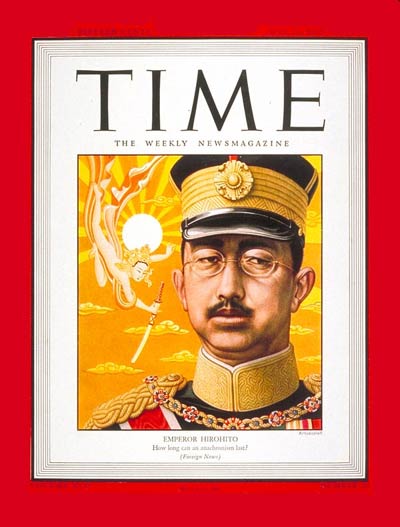 |
| Hirohito |
Emperor Hirohito of Japan lived in an age of contradictions, caught between ancient traditions and modern realities. The 124th in the line of the longest dynasty the world has known, Hirohito saw the Japanese monarchy become purely ceremonial. Japan was modernized during his reign when he died after 63 years on the throne, the longest reign of modern monarchs.
The Japanese emperors were said to be direct descendants of the sun goddess who founded Japan more than 2,500 years ago. After World War II at U.S. demand, he issued a renunciation of any claims to his divinity after ruling over his country during one of its most militaristic periods.
Born on April 29, 1901, Hirohito was the first son of Crown Prince Yoshito, son of Emperor Mutsuhito (better known as the Meiji emperor). As was the custom with the royal household, while still a tiny infant Hirohito was taken from his mother to be reared by foster parents.
  |
Count Kawamura, the foster father, was already 70 years old when he took the responsibility of rearing the royal infant, and he died when the child was three years old. At that time, Hirohito was returned to the residence of his parents, Akasara Palace. Even here, however, Hirohito was isolated from other children and from his parents. He rarely saw his unemotional father and visited his mother once a week.
In 1908 the young Hirohito was sent to Peers School, founded especially for males of noble birth, where he became interested in natural history and science. This interest developed into a passion for marine biology, a field in which Hirohito became a worldwide authority and on which he published eight books.
Meiji died in 1912 and was succeeded by Hirohito's father, the Taisho emperor; Hirohito, the heir apparent, became engaged to the daughter of a nobleman, Princess Nagako, in 1918, who became his only wife, bearing him five daughters and two sons.
 |
| As time magazine cover |
In 1921 Hirohito, along with an enormous retinue, made an unprecedented visit to Europe. No other Japanese crown prince had ever visited another country. He was greatly impressed with what seemed to him the informality and freedom of the rulers, especially the British royal family. Later that year Hirohito was named regent for his father, who was declining mentally. In 1923 he survived an attempted assassination by a young radical.
At the age of 25 Hirohito became emperor of Japan. He chose the name Showa (Enlightened Peace) for his reign. Hirohito's grandfather had helped bring Japan into the modern world when he had dismantled the powers of the feudal shogun. When he came to the throne, Japan, like much of the world in the 1920s, was in the midst of growth and optimism.
However, in the midst of the Great Depression of the 1930s, Japan became more fascist and militaristic, with many assassinations and domestic unrest, culminating in an uprising in January 1936 during which Tokyo was under the direct command of military divisions. Hirohito acted swiftly to control the insurrection and punish the leaders, but Japan's military continued to gain strength.
   |
Japan invaded China in 1937 without Hirohito's direct approval but also without his intervention. The emperor did not like the policies of Nazi Germany and Fascist Italy, but he did not openly oppose Japan's alliance with them; he signed the declaration of war against the United States and the Allies in 1941. Hirohito's participation in events that led to and during World War II remain controversial due to the destruction of many documents immediately after Japan's surrender.
Evidence shows that while he was not instrumental in Japan's aggressions beginning in the 1930s, he was fully aware of Japan's wartime goals and methods and participated in key meetings and decision making. In 1945 Hirohito made his famous radio address asking his people to surrender. It was the first time that the public had ever heard his voice.
When the United States began its occupation of Japan, Hirohito accepted full responsibility for the war and offered to abdicate his throne. However, the Allies felt Japan's stability would be better preserved if the emperor remained.
 |
| Hirohito in his old age |
As the figurehead ruler under the constitution promulgated in 1947, Hirohito had the luxury of devoting the remainder of his life to his scientific pursuits. He tried to establish a more open relationship with the people, and although he was a popular figure, he was awkward when meeting them.
Emperor Hirohito made two more foreign visits in his later years. In 1972 he traveled to Europe, and in 1975 he visited the United States. He died on January 7, 1989, and was succeeded by his eldest son, Crown Prince Akihito.